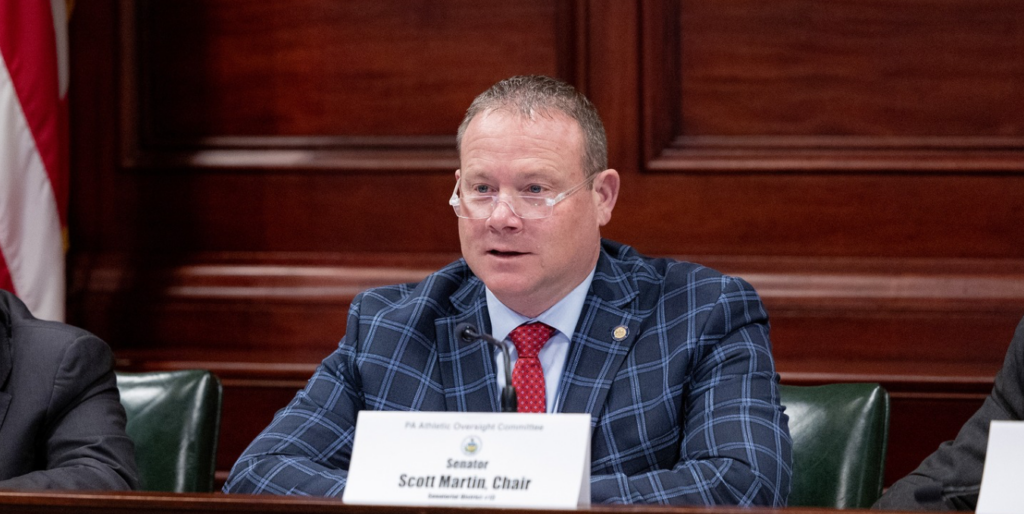Beth Ann Rosica: Hold the phone
Government overreach is what propelled me into politics, advocacy, and ultimately journalism. As someone who fought to open schools, eliminate mandatory masking, and help pass the constitutional amendment limiting the governor’s powers, I am not a fan of the government interfering in my life or parenting decisions.
So, when I read Senator Ryan Aument’s (R-Lancaster) proposed legislation to restrict cell phones in schools, I had mixed feelings. On the one hand, as a parent to teenagers, I see the daily, negative effects of excessive technology use, and I question whether it is as dangerous for them as drinking alcohol or taking drugs. But as a libertarian committed to the least amount of government possible, I was not completely sold on the concept that the state needed to intervene.
That is, until I read The Anxious Generation, by Jonathan Haidt, published earlier this year. If a genie granted me one wish, I would ask that every parent and educator read this book. The author presents a compelling argument why schools should ban cell phones, in addition to granting more play time. Haidt provides a wealth of evidence to help explain the current adolescent mental health crisis that started to exponentially rise in 2010. He defines this period as the “Great Rewiring.”
“Between 2010 and 2015, the social lives of American teens moved largely onto smartphones with continuous access to social media, online video games, and other internet-based activities. This Great Rewiring of Childhood, I argue, is the single largest reason for the tidal wave of adolescent mental illness that began in the early 2010’s.” (page 44)
The evidence of the harm caused by children spending excessive amounts of time online cannot be understated, and social media usage is one of the most damaging technologies, especially for girls and young women.
“Social media use is a cause of anxiety, depression, and other ailments, not just a correlate.” (page 148)
Most parents I know express concerns about the amount of time their kids spend on technology. We have worries about online content, ranging from extreme issues of predators and pornography to the daily battles about how much time online is too much.
Haidt addresses these issues and explains that parenting started to change prior to the introduction of the smartphone when parents become overprotective of their children in the real world. Yet, he asserts, parents are generally underprotective of their children in the online world.
At the conclusion of the book, after reviewing extensive data on the mental health decline of children across the world, Haidt offers solutions about what schools can do right now.
“To address the widespread anxiety in this generation, there are two big things that schools could do using mostly resources they already have. These are phone-free schools and more free play.” (page 247)
He suggests skipping expensive programs, like social emotional learning, in favor of a simple, inexpensive decision to eliminate cell phones in school.
Many people mistakenly assume that cell phones are already banned or limited in schools. However, the reality is that in most public schools, kids are still accessing their phones even if they are not allowed to. Many schools have rules that phones cannot be used during class, but kids find a way to sneak looking at them, and teachers should not have to sacrifice instructional time to police illicit cell phone use.
According to Haidt, much of the drama, bullying, and violence that occurs in schools stems from social media that is being accessed during the school day. If those issues could be reduced and student mental health improved with an inexpensive simple decision, why would we not do that?
Haidt’s research is corroborated locally by a substitute teacher, who asked to remain anonymous. This teacher works in the majority of schools in Chester County and said that 70 percent of students are not actively engaged in learning. Despite the presence of “No Cell Phones” signs, the substitute teacher reported that most students use their phones and earbuds constantly. They said that teachers seem to have abandoned whole group instruction, preferring to use the smart boards while sitting at their desks. They believe that decreased student engagement is a result of an overreliance on technology, resulting in more aggressive student behavior.
Consistent with the book’s conclusion, Senator Aument believes it is incumbent upon the legislature to act now to address what is happening to our students. “While it’s great that the commonwealth dedicated an additional $100 million last year to schools to care for students’ mental health, that money won’t go very far unless we get at the root cause of the problem. Because we know widespread access to smartphones and social media apps increases depression, anxiety, feelings of isolation, and even suicidal thoughts in teens and children, my bill is a commonsense approach to improve student mental health and academic performance alike.”
The press release explains the methodology of the proposed “legislation to limit students’ use of cellphones in schools through secure, lockable phone bags in which students would deposit their mobile devices until the end of the school day.”
Many private and parochial schools have already adopted similar policies.
Villa Maria Academy, an all-girls school located in Malvern, enacted a no cell phone policy a few years ago. Principal Sister Regina Ryan said, “the reason was to eliminate a controllable distraction in a classroom as well as to ensure that students learn to converse and be present to each other at lunch or in other ‘free time’ situations. Social interaction and the ability to hold a conversation are acquired skills anymore, and we want to educate the entire person.”
According to their student handbook, “all cell phones must be silenced in bags from 7:50 a.m. until after announcements, prayers and dismissal.” Sister Regina added, “I do know that I would never teach in a school now that did not have the policy.”
Students across the Commonwealth are struggling academically, socially, and behaviorally. Public schools are clamoring for more funds to address the academic and mental health crisis, and teachers are requesting more resources.
Despite my disdain for mandates, I support the proposed bill to restrict cell phones in school. With clear evidence similar to the effects of alcohol on children and adolescents, I believe that we have a responsibility to create classrooms conducive to learning. That is the primary purpose of education – to learn and grow. If cell phones are impeding that goal, they need to go.
Let’s be honest, most adults have difficulty staying on task and focused. How many of your colleagues are constantly on their phones during meetings or a conversation? If adults struggle with the temptation of looking at their phones every few minutes or even seconds, how can we expect our kids not to?
While our kids may initially view this modest proposal as alarming as the parents in Ireland who were told to sell their children for food, if it improves their mental health and academics, it is incumbent upon the legislature to work across the aisle to pass the bill.
Our children have nothing to lose and everything to gain.
Beth Ann Rosica resides in West Chester, has a Ph.D. in Education, and has dedicated her career to advocating on behalf of at-risk children and families. She covers education issues for Broad + Liberty. Contact her at barosica@broadandliberty.com.





Thanks Dr. Rozica. Let’s get at the root cause of mental illness and reintroduce our kids to real communication.
How does a proposal as this one (which is a great one) gain any traction or support when those parents responsible for their children’s education are completely addicted to their own smartphones? How do you gain even a modicum of co-operation from the students when they are exposed to their parents’ constant use of phones, very often to the point of being ignored in favour of phone use. I would like to see no one being allowed to own or use a cellphone until age 21 and then only with a license.
For it in principle. However, have doubts about how enforceable it is.
1. The proposal is very prescriptive to a specific method: “Description: Require the use of secure, lockable phone bags in all public schools across the Commonwealth.” One can imagine the rush for the bags at then end of the day or the period to get the cell phone, the inevitability of the locks not working, and the smuggling of cell-phones, etc.
2. Cell-phones have become ubiquitous for contact with kids for extra-curriculars. Especially as public phones are now a rarity, as well as the disappearance of “the late bus”.
3. Perhaps most insidiously is the proliferation of tools used by the schools themselves, to send text updates, access portals, etc. to stay in contact with students.